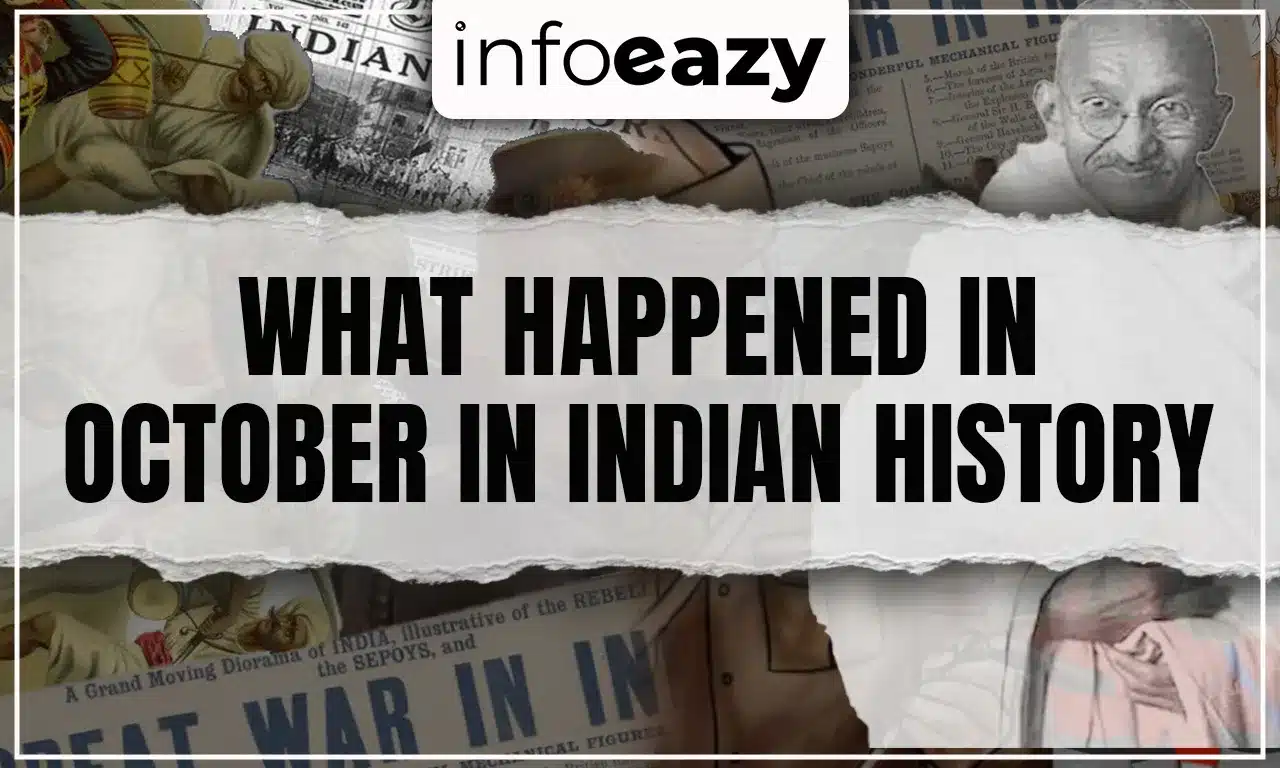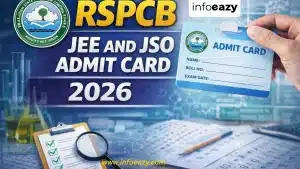Indian history is full of turning points, and the month of October holds a special place in it. From the birth of great leaders like Mahatma Gandhi and Dr. A.P.J. Abdul Kalam to significant battles like the Indo-China War of 1962, October has witnessed events that shaped India’s past, present, and future.
This article provides a day-by-day record of important events in October in Indian history, with detailed explanations, tables, and key highlights.
Importance of October in Indian History
October has repeatedly marked India’s historical journey with events that influenced politics, society, and culture.
- Many birth and death anniversaries of iconic leaders fall in October.
- Landmark events like Partition of Bengal (1905) and the formation of the Azad Hind Government (1943) took place this month.
- October has seen both victories and tragedies, from Gandhi Jayanti celebrations to Indira Gandhi’s assassination.
- It is also a month when festivals like Dussehra and Durga Puja are celebrated, adding cultural importance.
Chronological List of Events in October in Indian History
The chronological list of events in October in Indian history highlights key political, social, and cultural milestones that shaped the nation, which has been tabulated below:
| Chronological List of Events in October in Indian History | ||
| Date | Event | Importance |
| Oct 2, 1869 | Birth of Mahatma Gandhi | Father of the Nation, pioneer of non-violent struggle. |
| Oct 2, 1904 | Birth of Lal Bahadur Shastri | 2nd Prime Minister, slogan “Jai Jawan Jai Kisan.” |
| Oct 8, 1932 | Formation of Indian Air Force | Strengthened India’s defense forces. |
| Oct 10, 1906 | Formation of All India Muslim League | Key role in Partition of India (1947). |
| Oct 11, 1902 | Birth of Jayaprakash Narayan | Socialist leader, “Total Revolution” movement. |
| Oct 15, 1931 | Birth of Dr. A.P.J. Abdul Kalam | Missile Man of India, 11th President. |
| Oct 16, 1905 | Partition of Bengal by Lord Curzon | Sparked Swadeshi Movement. |
| Oct 16, 1978 | Arrest of Indira Gandhi | Turning point post-Emergency. |
| Oct 20, 1962 | Sino-Indian War begins | Conflict with China over Himalayan border. |
| Oct 21, 1943 | Formation of Azad Hind Government | Subhas Chandra Bose’s fight for independence. |
| Oct 24, 1945 | Establishment of United Nations | India as a founding member. |
| Oct 31, 1875 | Birth of Sardar Vallabhbhai Patel | Iron Man of India, architect of unity. |
| Oct 31, 1984 | Assassination of Indira Gandhi | Political unrest and anti-Sikh riots. |
Key Milestones in India’s Freedom Struggle in October
October played a defining role in India’s independence journey. The birth of Mahatma Gandhi (Oct 2, 1869) and Jayaprakash Narayan (Oct 11, 1902) gave the nation leaders who inspired mass movements. The Partition of Bengal (Oct 16, 1905) sparked the Swadeshi Movement, while Netaji Subhas Chandra Bose’s Azad Hind Government (Oct 21, 1943) declared India’s freedom from British rule.
| Key Milestones in India’s Freedom Struggle in October | ||
| Date | Event | Impact |
| Oct 2, 1869 | Birth of Mahatma Gandhi | Father of Nation; led non-violent freedom struggle. |
| Oct 11, 1902 | Birth of Jayaprakash Narayan | Socialist leader, inspired democratic protests. |
| Oct 16, 1905 | Partition of Bengal | Sparked the Swadeshi Movement against British goods. |
| Oct 21, 1943 | Azad Hind Government Formation | Netaji Bose’s declaration of India’s independence. |
Also Check: What happened in July in Indian History, Dates and Events
October 2, 1869 – Birth of Mahatma Gandhi
Mahatma Gandhi was born in Porbandar, Gujarat, on October 2, 1869. His ideas of Ahimsa (non-violence) and Satyagraha (truth-force) became powerful tools against British colonialism. Gandhi Jayanti is celebrated every year as a national holiday, and the day is also recognized by the UN as the International Day of Non-Violence.
- Introduced non-violent resistance against British rule.
- Led movements like Non-Cooperation, Civil Disobedience, and Quit India.
- Inspired global leaders like Martin Luther King Jr. and Nelson Mandela.
October 2, 1904 – Birth of Lal Bahadur Shastri
India’s second Prime Minister, Lal Bahadur Shastri, was born in Mughalsarai, Uttar Pradesh. He is remembered for his simplicity and integrity. His slogan “Jai Jawan, Jai Kisan” boosted both soldiers’ morale and farmers’ pride during the 1965 war with Pakistan.
- Signed the Tashkent Agreement (1966).
- Strengthened India’s food security through Green Revolution policies.
- A leader known for honesty and humility.
October 8, 1932 – Formation of Indian Air Force
The Indian Air Force (IAF) was formally established on October 8, 1932. Since then, it has grown into one of the world’s strongest air forces. Every year, Air Force Day is celebrated on October 8 to honor its bravery and contribution.
- Played crucial roles in Indo-Pak wars (1947, 1965, 1971).
- Took part in humanitarian missions and disaster relief.
- Modernized defense with advanced aircraft and technologies.
October 10, 1906 – Formation of All India Muslim League
The All India Muslim League was founded in Dhaka (now Bangladesh) on October 10, 1906. Initially created to protect Muslim rights, it later demanded a separate nation, leading to the Partition of India in 1947.
- Played a crucial role under Muhammad Ali Jinnah.
- Advocated for Pakistan as a separate state.
- Created political divisions between communities.
October 11, 1902 – Birth of Jayaprakash Narayan
Known as Lok Nayak, Jayaprakash Narayan was born on October 11, 1902. He was a socialist leader who opposed Indira Gandhi during the Emergency and led the Total Revolution Movement (1974).
- Advocated for democracy and people’s rights.
- Inspired student movements and mass protests.
- Awarded Bharat Ratna posthumously.
October 15, 1931 – Birth of Dr. A.P.J. Abdul Kalam
Dr. Avul Pakir Jainulabdeen Abdul Kalam, India’s Missile Man, was born on October 15, 1931, in Rameswaram, Tamil Nadu. He became the 11th President of India and was loved as the People’s President.
- Key role in Pokhran-II nuclear tests (1998).
- Developed India’s missile and space programs.
- October 15 is celebrated as World Students’ Day in his honor.
October 16, 1905 – Partition of Bengal
Lord Curzon announced the Partition of Bengal on October 16, 1905. The division was aimed at reducing the growing nationalist movement but instead led to widespread protests and the Swadeshi Movement.
- Bengal was divided into East Bengal (Muslim majority) and West Bengal (Hindu majority).
- Triggered boycotts of British goods.
- Later annulled in 1911 due to public unrest.
October 16, 1978 – Arrest of Indira Gandhi
On October 16, 1978, former Prime Minister Indira Gandhi was arrested on corruption charges after the Emergency period. This event marked her political downfall, though she later regained power in 1980.
- Reflected political instability.
- Sparked debates on misuse of power.
- A turning point in Indian democracy.
October 20, 1962 – Sino-Indian War Begins
On October 20, 1962, India and China went to war over disputed Himalayan borders. The war lasted for a month and ended with a ceasefire on November 21. India suffered heavy losses.
- Exposed India’s defense weaknesses.
- Led to reforms in military strategies.
- Left a legacy of mistrust in Indo-China relations.
October 21, 1943 – Formation of Azad Hind Government
Netaji Subhas Chandra Bose announced the formation of the Azad Hind Government on October 21, 1943, in Singapore. It was recognized by countries like Japan and Germany.
- Declared war against the British Empire.
- Inspired Indian soldiers of INA (Indian National Army).
- Symbol of India’s fight for independence.
October 24, 1945 – United Nations Established
Although a global event, India was a founding member of the United Nations (UN), which was established on October 24, 1945. India has since contributed to UN peacekeeping missions and global diplomacy.
- India supported anti-colonial struggles worldwide.
- Played a strong role in advocating for peace.
- October 24 is celebrated as UN Day.
October 31, 1875 – Birth of Sardar Vallabhbhai Patel
Sardar Vallabhbhai Patel, the Iron Man of India, was born on October 31, 1875. He played a critical role in uniting over 500 princely states into the Indian Union after independence.
- First Deputy Prime Minister of India.
- Advocated national unity and integration.
- Honored with the Statue of Unity in Gujarat.
October 31, 1984 – Assassination of Indira Gandhi
On October 31, 1984, Prime Minister Indira Gandhi was assassinated by her Sikh bodyguards. Her assassination triggered anti-Sikh riots, which caused thousands of deaths across India.
- Marked one of the darkest chapters in Indian politics.
- Led to Rajiv Gandhi becoming the next Prime Minister.
- Changed the course of Indian democracy.
October Events in Indian History FAQs
Q1. Why is October 2 important in Indian history?+
Q2. What happened on October 16, 1905?+
Q3. Which war began in October in Indian history?+
Q4. Who was assassinated on October 31, 1984?+
Q5. Which famous leaders were born in October in India?+
Tags: famous leaders Which famous leaders were born in October Which famous leaders were born in October in India?




